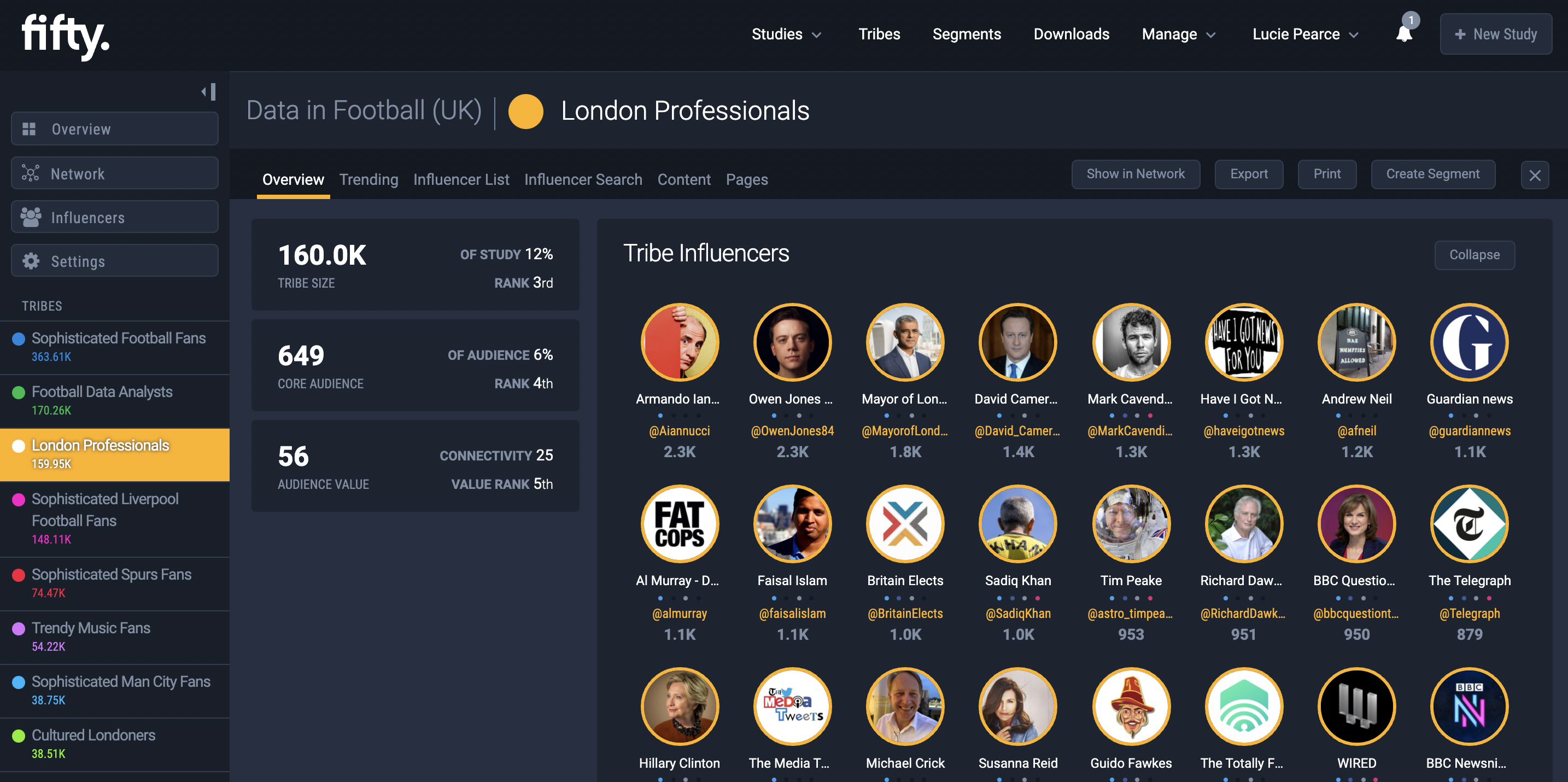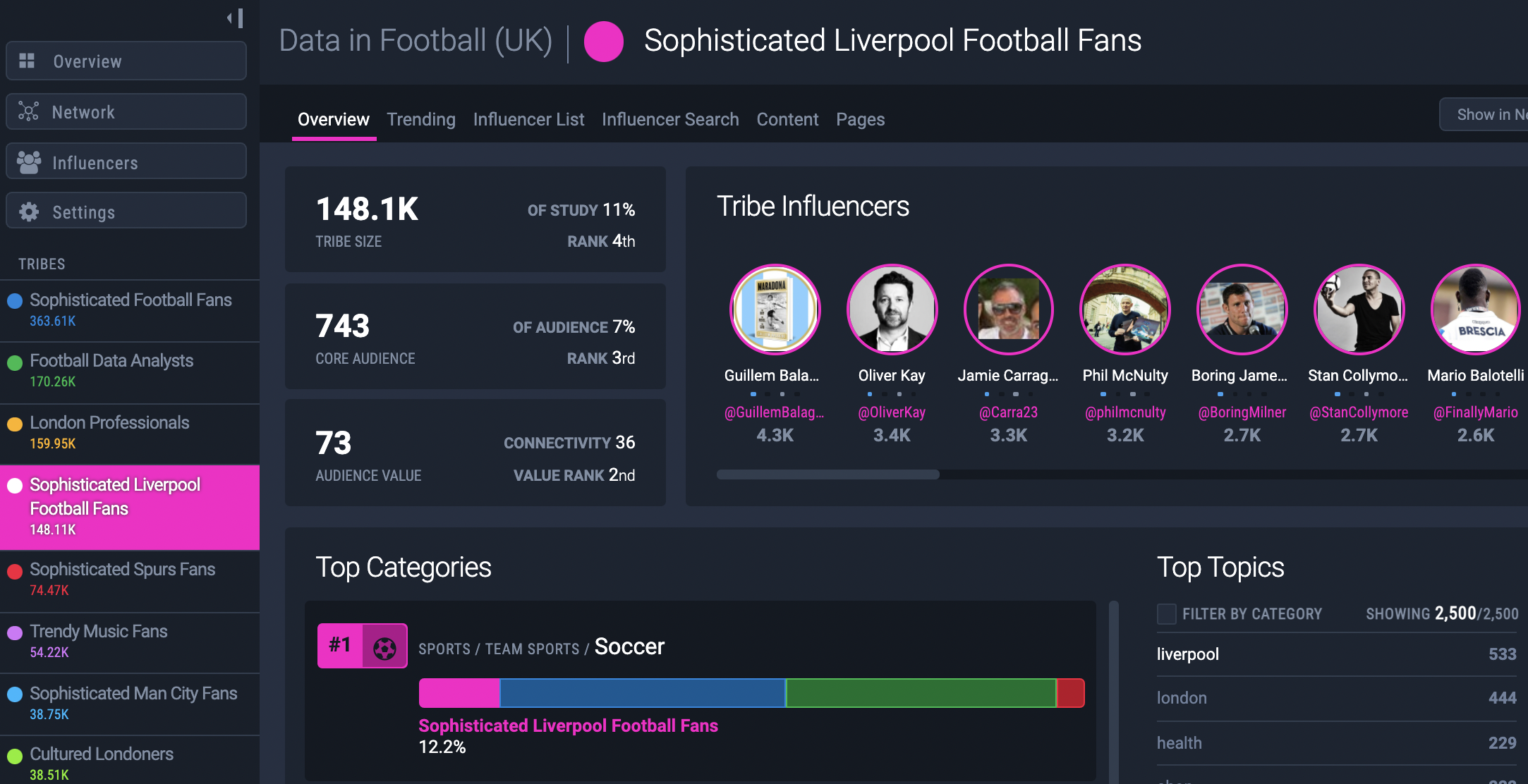The advent of data and analytics in football has turned professional football into as much of a science as an art. From behemoths like Liverpool down to aspirers like Brentford, data is changing the way teams approach games.
It has also created a new type of football fan, one that no longer spends their days arguing over refereeing decisions and judging players purely by eye - but a fan assessing teams/players based on their ‘underlying metrics’, in search of a more holistic, accurate judgement.
Bloggers, podcasters and analysts on Twitter have built thriving communities around football analytics, with many entering the professional field of football recruitment – a sign of their popularity and respect.
We wanted to understand: who are these analytics fans driving football's data revolution? To do that we analysed the audiences of some of the most successful football analytics content creators (such Jay Socik, recently employed by Luton Town off the back of his Twitter analysis), media outlets ( such as popular YouTube podcast Tifo Football) and brands (such as StatsBomb who are increasingly becoming the hub of data collection).
Read on to discover the audience propelling the new era of football fanalytics.
The Professional Fan
Unlike typical football audiences, the fanalytics audience has quite a professional demographic, with many engaging in the field of technology, with tribes of Digital First Professionals and Tech Developers emerging. The emergence of these tribes makes sense, with the innovation and sophisticated analysis of data appealing to more tech-savvy fans.
A New Football Twitter

This tribe’s bio keywords belies the professional success and digital lifestyles they enjoy: ‘director’, ‘digital’, ‘business’, ‘manager’ and ‘tech’.
Football social media culture is largely ruled by Gen Z; however, in this instance we see a divergence from the norm, with Millennials and Gen X dominating. Tribes such as London Professionals [see image above] and Cultured Londoners allude to this older generation, while we only uncovered one small tribe of Edgy Gen Zers.
Football Manager Over FIFA
EA Sports’ all-conquering video game FIFA was actually dethroned by Sega’s Football Manager in this audience (indexing 20x higher than FIFA), with its emphasis on tactics and scouting clearly appealing far more to the data-driven fan. In fact, many have tied the emergence of statistics and data into football to FM’s return to the mainstream.
Informing, Not Arguing
Football Twitter has notoriously been hosted by fan accounts, dedicated either to particular clubs or to players and are renowned for driving some of the most toxic, endless debates in football. In a typical football study, these are the key points of engagement, however, here we see journalists and writers emerge as central figures of engagement. Seventeen of the top 50 most influential accounts across the whole study are journalists, highlighting the importance of staying informed for these groups and serious outlets such as The Guardian and The Athletic are preferred over tabloids.
Football Fans, Not Club Fans

While this is largely a tribe of Liverpool fans, there is clearly a broader footballing engagement beyond just Liverpool.
Interestingly, we see much less segmentation around actual clubs and teams. The online tribalism of football is near impossible to avoid when analysing any football audience, but in this instance we actually see far fewer devoted ‘superfan’ tribes emerge.
Instead, we have a broader engagement with football content that is club-agnostic. Even in tribes that do cluster around support for a specific team, there remains this broader footballing engagement, as outlined in the point above.
This implies that these football fans are perhaps more devoted to the sport as a whole than to one club in particular. Perhaps this goes some way to explaining the far less toxic culture that underpins the community.
Football's New Culture
Overall, we have a quite clear image of what the more analytically-minded football fan looks like: they are sophisticated, tech-savvy Millennials who are more passionate about football as a whole than they are about any one team.
Social media notoriously brings out the worst in football fans, but with the birth and growth of this new community it offers fans an alternative, less combative and more sophisticated way to engage with the sport they love. Evidently, analytics are changing the game for the better both inside and out.
Likes these insights on football's data revolution? Catch up on other latest trends and insights here.
To find out how Fifty can discover new understanding of your audience, book a demo.








































